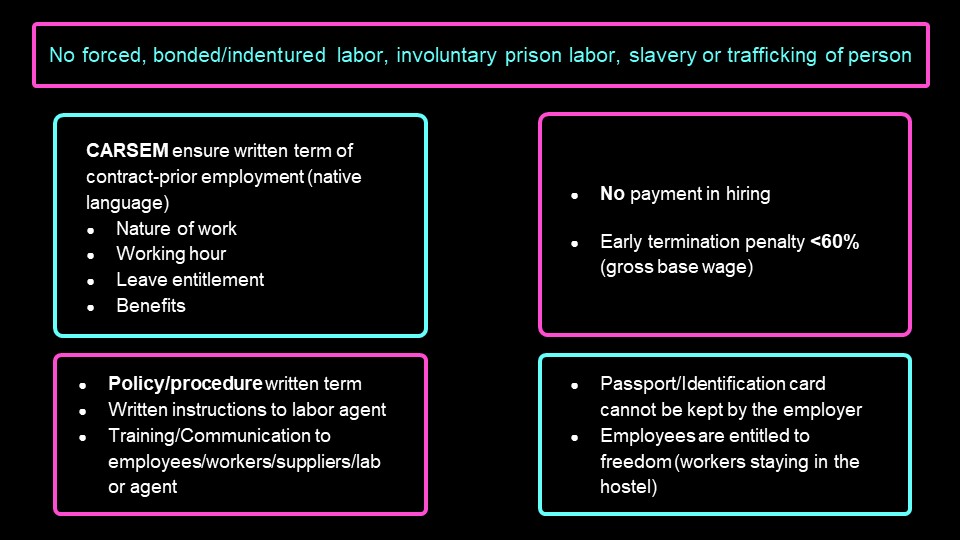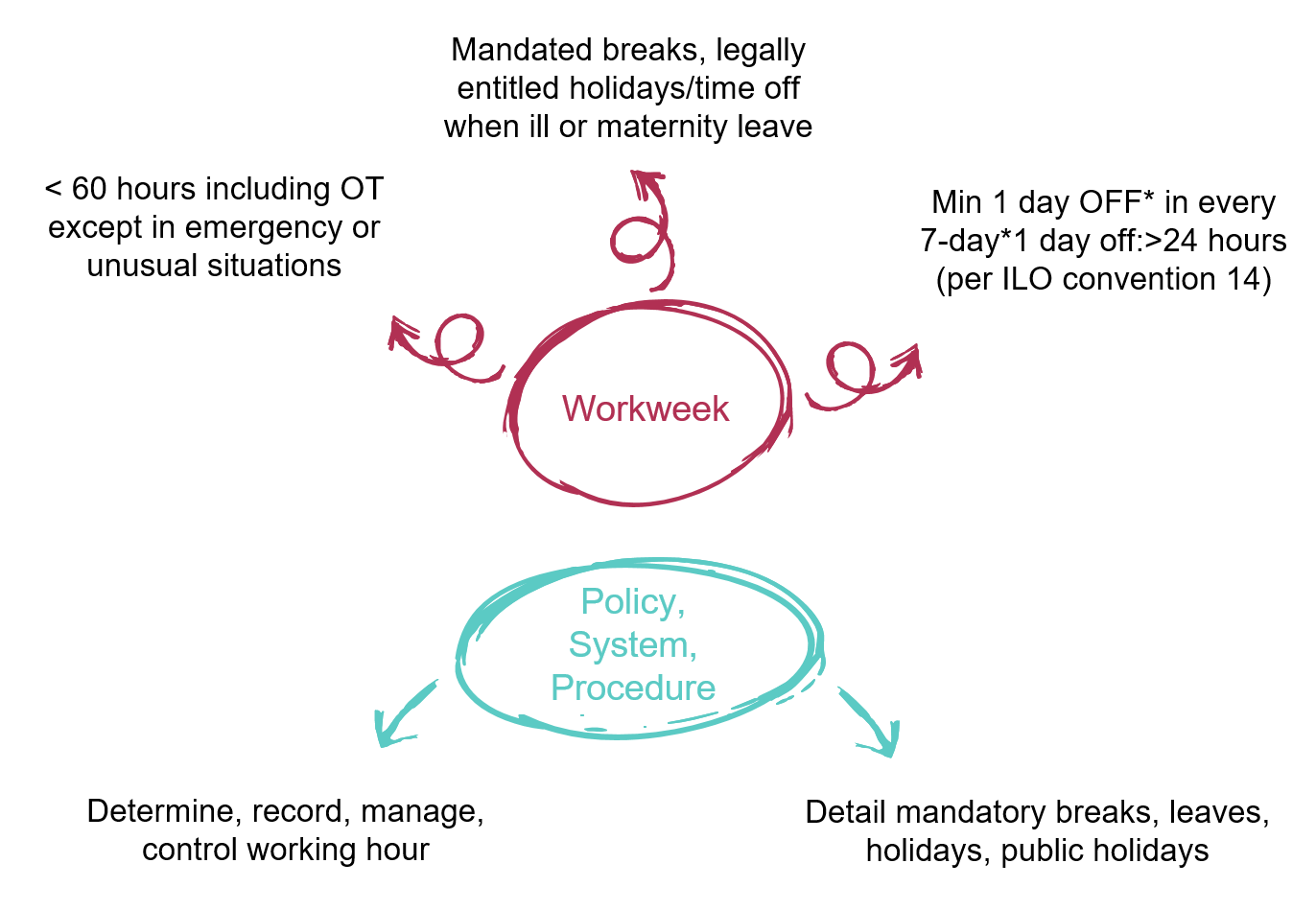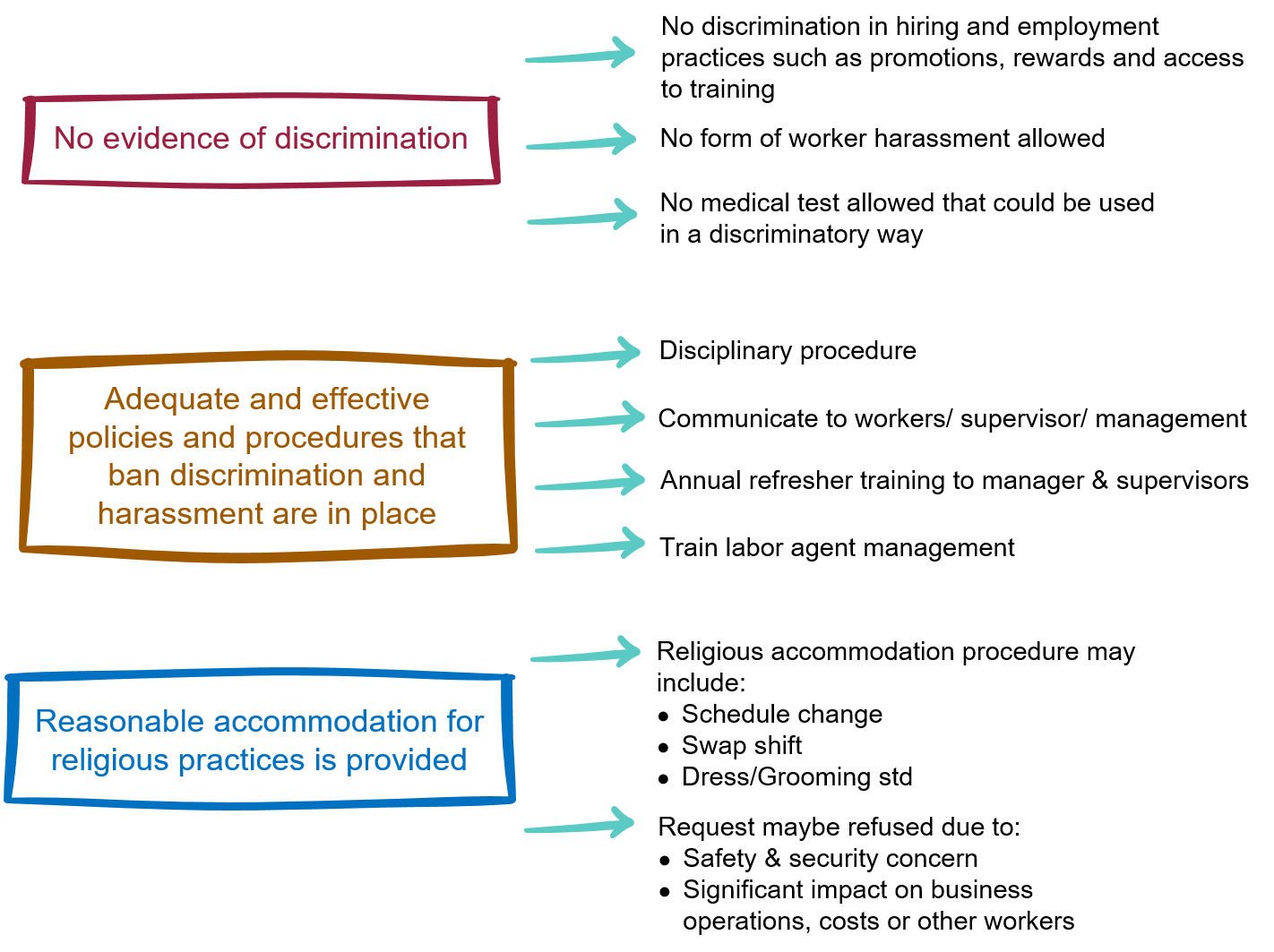We are striving to be one of the most inclusive and diverse organizations globally, where everyone feels respected, valued and cared for. In alignment with the UN Guiding Principles on Business and Human Rights, at Malaysian Pacific Industries (MPI), we have committed to align our operations with the provisions of the Responsible Business Alliance (RBA) Code of Conduct. The provisions in this Code are derived from and respect internationally recognized standards including the ILO Declaration on Fundamental Principles and Rights at Work and the UN Universal Declaration of Human Rights. Our businesses are accordingly aligned – Carsem is a registered member/ Participant of RBA Code of Conduct, and Dynacraft conforms to the RBA Code of Conduct.
We take actions to ensure an environment that provides a strong sense of belonging, and being valued & respected to everyone – our employees, our customers, business partners and suppliers. We expect our leaders to live by our values and demonstrate these behaviours. While we have made progress in developing a diverse and inclusive workplace, we know that we can do more, and we will continue to do so. At MPI, everyone is expected to live by our core values of honesty, integrity and respect for people. In line with our Code of Conduct, we offer equal opportunities to everyone. We work in line with local policies, laws and regulations.
Our Senior Leadership Team (SLT) comprehensively reviews all possible risks associated with labor practice, and performs necessary due diligence to ensure all appropriate actions have been defined & taken before commencement of new operations or projects at all of our facilities. Similarly, risk assessment for existing operations is carried out yearly to ensure all identified labor practice related risks have been weighed and adequately addressed via procedural & physical controls, while maintaining regulatory compliance.
Our dedicated IR team members ensure compliance with all labor laws. The mechanisms used for identifying any non-compliance is via an annual compliance audit performed by our internal QA department or via spot audit by labor court. We ensure quick and appropriate resolution of every identified incident of non-compliance of our labor practice in the shortest possible duration.
Moreover, to improve our employees’ knowledge and awareness around labor practices, we regularly participate in IR training, seminars, and engage in collaborations with JTK, labor office seminar, etc. Also, we conduct regular on-site training on various relevant topics such as foreign workers affairs seminar, preventing forced labour through Responsible Business Practices, Compensation and Benefit workshop, Labour law, Compliance to Act and Regulations, and many more. We ensure communication of our commitments and provisions of the RBA Code of Conduct through several channels to all our employees globally. These include comprehensive briefing during employee onboarding induction, and employee communication channels such as intranet and corporate website. We ensure that the language used for all such training & communication is suitable taking into consideration the language spoken and understood by the employees in various locations. All the training & communication material, including the Code, is translated & available in relevant languages – English, Bahasa, and. Chinese.
We have put in place several mechanisms that allow our employees to engage with management, raise concerns and report instances of potential non-compliance with our values and code of conduct. These include Whistleblowing, manual and e-feedback form, employee survey, daily briefing sessions, open-door policy, and many more. Our managers undergo appropriate training to handle any reports or instances of non compliance with our values, including bullying or harassment. Our controls encourage two-way communication, and allow employees to share their thoughts anytime without any restrictions. Our Mentor-Mentee program allows our employees to share & escalate any wrongful acts to their respective mentors, and further to the relevant parties.
We are committed to contributing to a more equal and better world by creating a truly diverse and inclusive organization. The resulting abundance of experience and perspectives will help us continue to innovate and grow into an ever evolving, even stronger organization.
We are committed to uphold the human rights of workers, and treat them with dignity and respect as understood by the international community.
This applies to all workers including temporary, migrant, student, contract, direct employees, and any other type of worker.
Elements of labor management, in line with RBA Code of Conduct:
- Freely Chosen Employment
- Young Workers
- Working Hours
- Wages and Benefits
- Humane Treatment
- Non-Discrimination
- Freedom of Association
Forced, bonded (including debt bondage) or indentured labor, involuntary prison labor, slavery or trafficking of persons shall not be used.
This includes transporting, harboring, recruiting, transferring or receiving persons by means of threat, force, coercion, abduction or fraud for labor or services. There shall be no unreasonable restrictions on workers’ freedom of movement in the facility in addition to unreasonable restrictions on entering or exiting company-provided facilities. As part of the hiring process, workers must be provided with a written employment agreement in their native language that contains a description of terms and conditions of employment prior to the worker departing from his or her country of origin.
All work must be voluntary and workers shall be free to leave work at any time or terminate their employment. Employers and agents may not hold or otherwise destroy, conceal, confiscate or deny access by employees to their identity or immigration documents, such as government-issued identification, passports or work permits, unless such holdings are required by law. Workers shall not be required to pay employers’ or agents’ recruitment fees or other related fees for their employment. If any such fees are found to have been paid by workers, such fees shall be repaid to the worker.
Child labor is not to be used in any stage of manufacturing. The term “child” refers to any person under the age of 15, or under the age for completing compulsory education, or under the minimum age for employment in the country, whichever is greatest. The use of legitimate workplace learning programs, which comply with all laws and regulations, is supported.
Workers under the age of 18 (Young Workers) shall not perform work that is likely to jeopardize the health or safety of young workers, including night shifts and overtime. Participant shall ensure proper management of student workers through proper maintenance of student records, rigorous due diligence of educational partners, and protection of students’ rights in accordance with applicable law and regulations.
Participant shall provide appropriate support and training to all student workers. In the absence of local law, the wage rate for student workers, interns and apprentices shall be at least the same wage rate as other entry-level workers performing equal or similar tasks.
Studies of business practices clearly link worker strain to reduced productivity, increased turnover and increased injury and illness. Workweeks are not to exceed the maximum set by local law. Further, a workweek should not be more than 60 hours per week, including overtime, except in emergency or unusual situations. All overtime must be voluntary. Workers shall be allowed at least one day off every seven days.
We comply with our respective local laws across all our facilities, and ensure that our employees do not perform work exceeding the maximum hours allowed by the local law.
Compensation paid to workers shall comply with all applicable wage laws, including those relating to minimum wages, overtime hours and legally mandated benefits. In compliance with local laws, workers shall be compensated for overtime at pay rates greater than regular hourly rates.
Deductions from wages as a disciplinary measure shall not be permitted. The basic on which workers are being paid is to be provided in a timely manner via pay stub or similar documentation. For each pay period, workers shall be provided with a timely and understandable wage statement that includes sufficient information to verify accurate compensation for work performed. All use of temporary, dispatch and outsourced labor will be within the limits of the local law.
There is to be no harsh and inhumane treatment, including any sexual harassment, sexual abuse, corporal punishment, mental or physical coercion or verbal abuse of workers; nor is there to be the threat of any such treatment. Disciplinary policies and procedures in support of these requirements shall be clearly defined and communicated to workers.

We take steps to ensure a workplace that is free of harassment and unlawful discrimination. We assign central importance to fair working conditions and employee rights, and reject all forms of discrimination based on race, color, age, gender, sexual orientation, gender identity and expression, ethnicity or national origin, disability, pregnancy, religion, political affiliation, union membership, covered veteran status, protected genetic information or marital status in hiring and employment practices such as wages, promotions, rewards, and access to training.
It begins by creation and promotion of an inclusive workplace, where all staff can perform at their best while valuing their differences.
Open communication and direct engagement between workers and management are the most effective ways to resolve workplace and compensation issues. The rights of workers to associate freely, join or not join labor unions, seek representation, and join workers’ councils in accordance with local laws shall be respected.
Workers shall be able to openly communicate and share grievances with management regarding working conditions and management practices without fear of reprisal, intimidation or harassment.
Carsem has quarterly “Teh Tarik” Sessions chit chat between labor & the company’s general manager and also Skip Level Meeting with the department manager. We also have biannual Department Communication Sessions, Executive Forums and a quarterly Star Award Programme to appreciate outstanding employees. This is a platform for communication between employees with management.
The Union committee at Carsem Ipoh has its collective agreement in place, and has been legally endorsed by the IR court. The Unions at Carsem Suzhou (China) and DCI (Penang, Malaysia) directly comply with their respective local laws.





